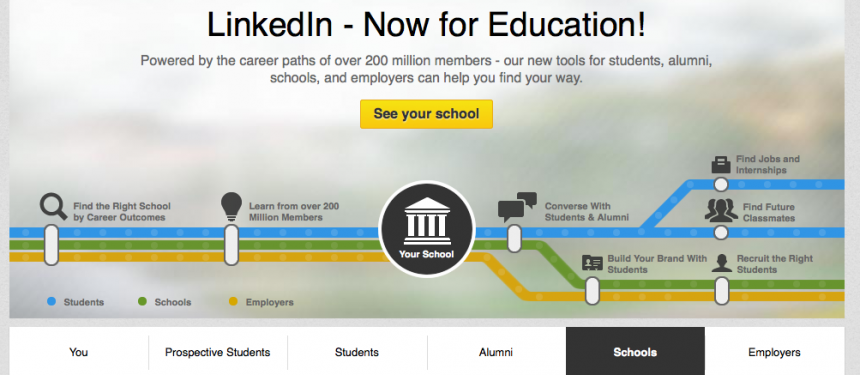Professional networking site LinkedIn has launched a new platform for universities that will bridge the gap between prospective students and graduate success stories. Through University Pages, students can see and search an institution’s alumni network based on nationality and job sector.
News and business analysis for Professionals in International Education
Have some pie!
LinkedIn’s University Pages connect students to alumni networks

Likewise, institutions will also have access to their followers’ contact information that can be segmented to facilitate targeted marketing campaigns. Further providing a recruitment boon for universities, LinkedIn is lowering the minimum age to join from 18 to 13 making university pages available to high school students.
LinkedIn Product Management Director Christian Allen said in a blog post that University Pages formed part of the company’s “strategy to help students at every critical milestone from campus to fulfilling, successful careers”.
“The fundamental difference between University Pages and Facebook or even LinkedIn company pages is that it’s based on profile information”
“I knew that hidden in millions of member profiles were powerful insights about the career outcomes of educations from universities around the world,” she wrote.
“If harnessed, these insights could provide incredible value for students – helping them explore possible futures and build a support network to help them succeed on campus and beyond.”
Previously universities have used Company Pages to create a community on the site. Now, once a person includes a university on their profile, they are automatically added to the institution’s network, taking out the element of “following” needed on other social networks.
After becoming one of the network’s top 10 company pages, global business school INSEAD was among the institutions asked to take part in the platform’s pilot group. Axel Tagliavini, Director of Digital Communications at INSEAD told The PIE News that the benefits of the page are three fold: marketing, recruitment and alumni networking.
“The fundamental difference between University Pages and Facebook or even LinkedIn company pages is that it’s based on profile information,” he explained. “When a university’s page is launched, it already has followers that you can target. In our case it was more than 50,000 people.”
With over 200 million users, LinkedIn ranks among the top three social networks in the world. Higher education is the third most common industry listed by its mostly USA-based membership.
The network’s fastest growing user cohorts are reflective of strong student source markets: Turkey, Colombia and Indonesia
However, the networks’s reportedly fastest growing user cohorts are reflective of strong student source markets: Turkey, Colombia and Indonesia. For the mobile site, China, Brazil, Portugal and India are showing the largest uptake.
The platform was piloted three months ago with 200 universities from around the world and was officially launched to all universities last month. Users, including high school students depending on country specific terms and conditions, will have access from September 12.
The details of every person in an institution’s community are available to the public and can be searched based on specific profile details including nationality, industry, connections and seniority level.
For prospective students they can see university news and connect with current students and alumni. For universities, they can leverage the contacts database to create targeted marketing campaigns.
With campuses on three continents, Tagliavini says having access to the database will “trigger a lot of new recruitment options for us”.
“It shows success stories to prospective students, but from an administrative perspective, we can now see that we have alumni in senior manager positions based in various countries who are working with top companies, and we can engage with them to come speak on campus for recruitment,” he said. “That’s very meaningful to us.”
Still looking? Find by category:



